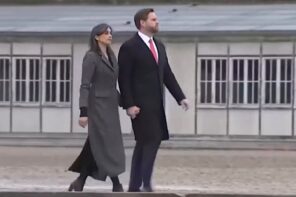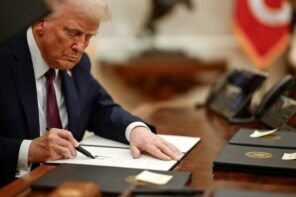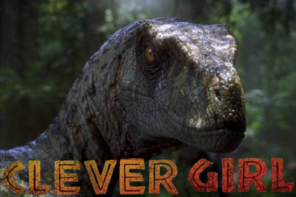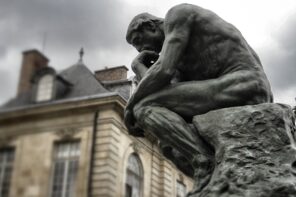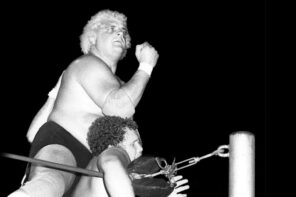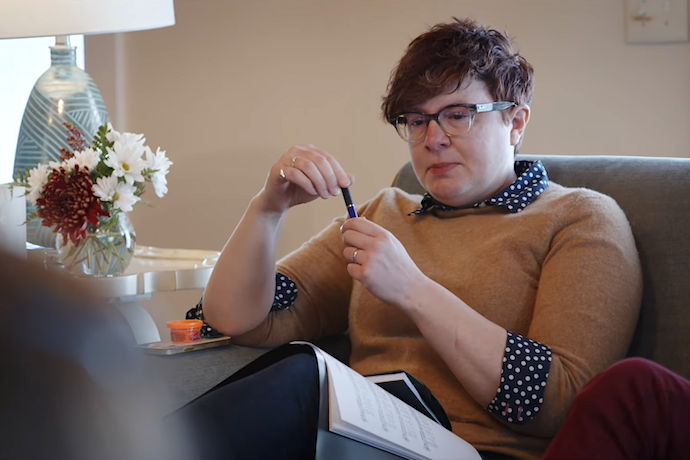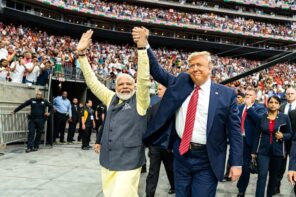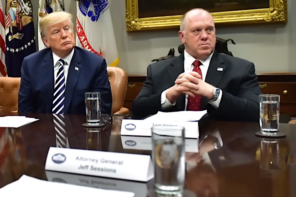Pundits, academics, and church leaders alike decry our current age as a time of partisan rancor and disunity. People, we are told, are locked in “echo chambers,” and they refuse to listen to those with whom they disagree. The Right and Left no longer listen to each other; they won’t even marry each other! The US is devolving into warring camps, and it is up to people of goodwill and good faith (we are told) to reach across political divides and recognize one another’s humanity, whether we vote red or blue.
Nicholas Ma’s new documentary, Leap of Faith, is yet another exercise in promulgating this particular cultural script. Ma, son of cellist Yo-Yo Ma, and producer of the feel-good Mr. Rogers documentary Won’t You Be My Neighbor?, clearly intends the film as a plea for unity and understanding in the US in general, and the Church in particular. But the film also shows, perhaps inadvertently, that unity and justice are not always, or necessarily, compatible. The movie edges around the insight that justice may be incompatible with reconciliation—and perhaps in some cases, incompatible with the Church itself.
The film focuses on the work of Michael Gulker, president of the Grand Rapids, MI-based Colossian Forum, which explores and bridges conflicts within the Christian community. Viewers follow a group of 12 pastors from Grand Rapids churches over a period of several months as they discuss and explore the issues that divide their congregations and communities. After a number of clichés are deployed to describe the deep divisions in US culture—“Our society is getting meaner,” claims one—Colossian resolutely walks participants through various exercises to identify areas of conflict, and helps the pastors work through their differences, respectfully and with love.
So far so good.
It quickly becomes clear, however, that there’s a major obstacle to the work of reconciliation—LGBT acceptance.
Gulker himself finds this rift especially painful. His children are both queer, and he clearly wants to support them and love them. But he also feels a commitment to Christian community. Initially he says that his commitment is to what he describes (inaccurately) as the church’s 2000 years of heteronormative tradition. But towards the end he admits that he had not actually been opposed to marriage equality at all. In fact, the motivation to stake out that position hadn’t been doctrine or tradition, but the preservation of Colossian’s institutional partnerships. “I was afraid that if I stated my position on gay marriage, that these organizations that had been working with us would pull out,” he says. “And I did state my position on gay marriage and they pulled out….And that was awful.”
In the end Leap of Faith emphasizes that Michael and the anti-LGBT pastors he’s worked with still get along; that love and fellowship can persist despite disagreement.
But there’s an alternate takeaway. Colossian’s institutional demand for reconciliation and unity, at least initially, prevented Michael from clearly stating what he truly believes. Worse, it prevented him from publicly accepting his children for who they are, and marginalized people who sorely needed his voice. The latter group includes lesbian Methodist Minister Joan VanDessel, who tells the group that after all the conversation, praying, and love, their lack of acceptance “was a lot more painful than I expected.” The film and the Colossian Forum insist that unity is a valuable goal, but in practice, the push for unity seems to have cemented some relationships, but largely at the expense of others. It led Gulker, to turn his back on his own values and caused him and his family unnecessary harm.
Unity, in short, seems less like a solution, and more like the problem. This wouldn’t surprise scholars Daniel Kreiss and Shannon C. McGregor, who, in a recent paper titled “A review and provocation: On polarization and platforms,” note that, like the pastors gathered by Colossian, social science researchers are very worried about partisanship. “For many researchers,” they say, “it is of foremost concern that Americans seemingly no longer respect or even tolerate one another, and fear the other side poses an existential threat to their very way of lives and livelihoods.”
But Kreiss and McGregor believe these concerns may be misguided:
The work of political historians, sociologists, and racial and ethnic studies researchers shows how the efforts of marginalized groups to achieve political and social equality—undertaken on and off platforms—often provoke powerful backlash from dominant groups, especially Whites in the United States.
In other words, division is not the problem. The problem is injustice and discrimination. When that injustice is challenged, it provokes resistance and backlash—or division. Division is a symptom of a struggle against injustice. But getting rid of the division by ignoring the injustice isn’t moral or adequate—you don’t deal with a head cold by chopping off your nose. Or, as Dr. Martin Luther King Jr. put it, “Peace is not simply the absence of conflict, but the existence of justice for all people.”
Leap of Faith is a film made from a Christian perspective with unity as a goal, so it never really asks why homophobia is so central to the church for so many, or whether that homophobia calls into question the value of Christian unity. It’s true that Christian support for LGBT people is growing, among a significant number of Christians. But it’s also true that for others, as the film shows, bigotry and prejudice against LGBT people are inseparable from their sense of their Christian faith—overriding personal friendships and institutional commitments.
This Christian bigotry is obviously inseparable from the Christofascist MAGA movement, which has also made discrimination against LGB and especially Trans people a core part of its agenda. The pastors gathered together in the film aren’t just disparate people with different opinions pursuing their faith as best they can; they’re representatives of a Christianity intertwined with political and nationalist movements. The call for Christian unity, in that context, is a call for unified power—whether that’s how they understand it or not. It’s also a way to undermine resistors by appealing to their spiritual and institutional affiliations.
Leap of Faith is important in part because it’s a small, inoffensive film which wants to be compassionate and welcoming. And yet, mostly despite itself, it ends up demonstrating the ways in which compassion, welcome, and faith can be weaponized as political tools against marginalized people who stand outside the circle of compassion.
Unity is never universal, which means that when people call for unity, the first questions should be: unity for what? and: unity against whom? When Christians today start talking about the need to bridge divisions among themselves, LGBT people—though not only LGBT people—have reason to fear.
